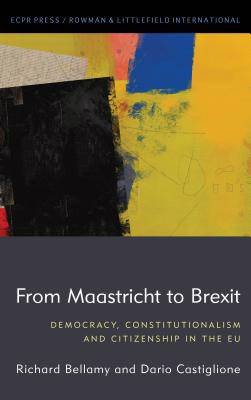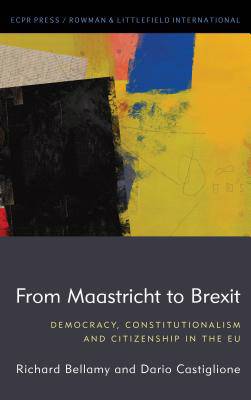
Bedankt voor het vertrouwen het afgelopen jaar! Om jou te bedanken bieden we GRATIS verzending (in België) aan op alles gedurende de hele maand januari.
- Afhalen na 1 uur in een winkel met voorraad
- In januari gratis thuislevering in België
- Ruim aanbod met 7 miljoen producten
Bedankt voor het vertrouwen het afgelopen jaar! Om jou te bedanken bieden we GRATIS verzending (in België) aan op alles gedurende de hele maand januari.
- Afhalen na 1 uur in een winkel met voorraad
- In januari gratis thuislevering in België
- Ruim aanbod met 7 miljoen producten
Zoeken
From Maastricht to Brexit
Democracy, Constitutionalism and Citizenship in the EU
Richard Bellamy, Dario Castiglione
Hardcover | Engels
€ 150,95
+ 301 punten
Uitvoering
Omschrijving
Is the European Union still a viable project? The last few years have been difficult both economically and politically, while its integrative function and legitimacy have been seriously tested. For many social, economic and geo-political reasons, its expansionary moment has stopped abruptly. On the contrary, the Greek economic crisis and the Brexit referendum have raised the spectre of fragmentation and political disintegration. The promise of the EU as a possible model for legitimate governance beyond the nation state lies somewhat in tatters. Even if the EU may indeed survive most of its current crises, is the project of a EU as a normative project beyond rescue? Ever since Maastricht, the democratic legitimacy of the EU has been a key concern of policy makers, citizens and academics alike. This issue is essentially a normative one, and over the same period our work in this area has been at the forefront in exploring what has come to be known (following an early working paper we wrote with this title in 2000) 'the normative turn in EU studies'. The debate on the democratic form and legitimacy of the EU is one that has gone on for some time and to which we, together with other scholars, have tried to contribute in the course of the last twenty years or so. Collecting articles written over the course of this period is not just meant as the testimony of an intellectual journey, but also a way of tracing such a journey in retrospect and mapping the important moments of the intellectual and scholarly debates that have contributed to shaping both our understanding and our expectations of the EU's possible futures.
Specificaties
Betrokkenen
- Auteur(s):
- Uitgeverij:
Inhoud
- Aantal bladzijden:
- 532
- Taal:
- Engels
Eigenschappen
- Productcode (EAN):
- 9781786609922
- Verschijningsdatum:
- 4/06/2019
- Uitvoering:
- Hardcover
- Formaat:
- Genaaid
- Afmetingen:
- 152 mm x 229 mm
- Gewicht:
- 948 g

Alleen bij Standaard Boekhandel
+ 301 punten op je klantenkaart van Standaard Boekhandel
Beoordelingen
We publiceren alleen reviews die voldoen aan de voorwaarden voor reviews. Bekijk onze voorwaarden voor reviews.









